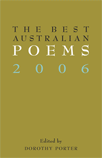 The Best Australian Poems 2006 edited by Dorothy Porter
The Best Australian Poems 2006 edited by Dorothy Porter
Black Inc., 2006
I've long been a fan of Dorothy Porter, the poet, and I can now say loudly and proudly that I am a fan of Dorothy Porter, the editor. Skimming through the index, I am immediately impressed by the range of texts drawn upon to assemble the collection. The poems were not all plucked from the 'best of the best', and this, I am confident, attributes to the range in voice. Porter has collected her own written Babel, amalgamating the generations and integrating the time-tested contemplations with full-blown shock waves.
But what I admire most about this work is the prelude. Porter displays such passion and conviction by introducing a collection of Australia's best poems from 2006 with an overture to the poets who have recently died, many of whom have indeed helped pave the long and narrow path for poets hobbling from anonymity to printed fame. In their own immortal words, Porter opens with Bruce Beaver's 'Prelude', a reflection which could only have been performed by a man nearing the end of his life: 'The only space I've inhabited / has been my self'. Shelton Lea's voice, incanting Sonny Booth's, in 'nebuchadnezzar' is penetrating and, so god-like, thunderous, it could be cause for night tremors: 'i am nebuchadnezzar / my balls are caught tight with white wire'. Richard Deutch's 'Danger' is so succinct, he hardly leaves room, or even desire, for breath:
Had I leapt
between them and tried
to yank them apart,
one mane in each hand,
I should have courted
far less danger
than that morning
in my skiff
when I stopped rowing
to watch you, poised
on the trunk of a dead tree
ready to dive
and set the river
on fire.
Vera Newsome's 'Midnight' almost calls out to us from the grave: 'For how many years / have I tended this fire? / Now it will die / as all fires must die. // Though my hands are frozen / I still hold them out.' And, finally, in Lisa Bellear's candid confessional 'To no one: and Mary did time', it's as if all of the stories of all of the women who kill their own children culminate in this:
I didn't mean to
kill my baby daught
I wasn't right
I was sickDear anyone to anyone
who just might care
I didn't know
I just didn't know
I'm still not
sure.
Reading the recently deceased poets' words, full of humour, sentiment, strength and helplessness, is both haunting and inspirational. I couldn't think of a better dedication to a collection of the year's best.
Their living contemporaries and successors, the voices of today, as represented by Porter's selection, hail from magazines new and old, both recognised and obscure, the Heats and the Blasts. They are plucked from the streets of Fremantle and Carlton, from the desks of publishers in St Lucia, Queensland and Kent Town, South Australia. They are the voices of the poets we've grown old with and of the poets who keep us young. They are the voices of Ian McBryde crooning memory in 'Songs for Paul' and Les Murray's nasal tones in 'The Nostril Songs'. In our year of war, James Charlton and Bruce Dawe bring beauty to meaning, life to death, and in our year of draught, we hear Martin Harrison's hymn to the plum tree and the complexity of fortitude. Jennifer Harrison's hum of a hundred bees coating one man's face can be heard as a droning symphony ('-he is motionless as a pixilated mother / looking down at the first tug on her breast- / does she, too, exhale?'); and lest we forget the songs of the clitoris and vulval wings sung by Susan Hampton and Susan Hawthorn.
Clive James reveals to us his ubiquitous voice through two love sonnets in one poem, making me rethink my stance on being staunchly opposed to traditional verse. I hear Ken Bolton paying homage to coffee and, not even a coffee drinker myself, I like it. I hear Laurie Duggan paying homage to T.S. Eliot and, being a lover of Eliot, I love it ('blow your nose, expectorate, / the world is filled with doctorates / waiting in the mist for a bus'). Neil Paech's voice is singled out in a crowded 'beached rd' and Ouyang Yu's at a scholarly social gathering. Voices can be heard from over the seas, resounding from distant shores, and they are the voices of Ateif Khieri's 'Girl' and Judy Johnson's 'The Photographer Francis Bacon and Sylvia Plath Stalk Big Game in Equatorial Africa.' I can hear the bold tinkle of Kerryn Tredrea's voice, vulnerable to insanity, and the vulnerable whisper of death blowing ashes hither and thither in Craig Sherborne's 'Ash Saturday':
This is what a man burns down to:
bone's grey grit like broken pebbles.
Not ash but grit and blood-brown dust
from the coffin they called 'Mahogany'.
The same salt 'n' pepper as his shaven stubble
that whiskered the sink-white from his razor
In an anthology swarming with quality verse varying from a concise half page to an excerpt still weighing in at four pages, these are a few of the voices that stood out for me and, beyond question, I have left out what others would see as the book's tiny treasures. These 101 poets (and I like that Porter goes that extra distance, failing to be predictable by rounding off to a likely number) are the voices of today – sometimes gentle, sometimes brash. I find it pleasing and proper that some hold this title alongside the golden-labelled voices of yesterday. All, with immense anticipation, should be identified as our voices of tomorrow.
Heather Taylor Johnson holds a PhD in Creative Writing and is a poetry editor of Wet Ink.














